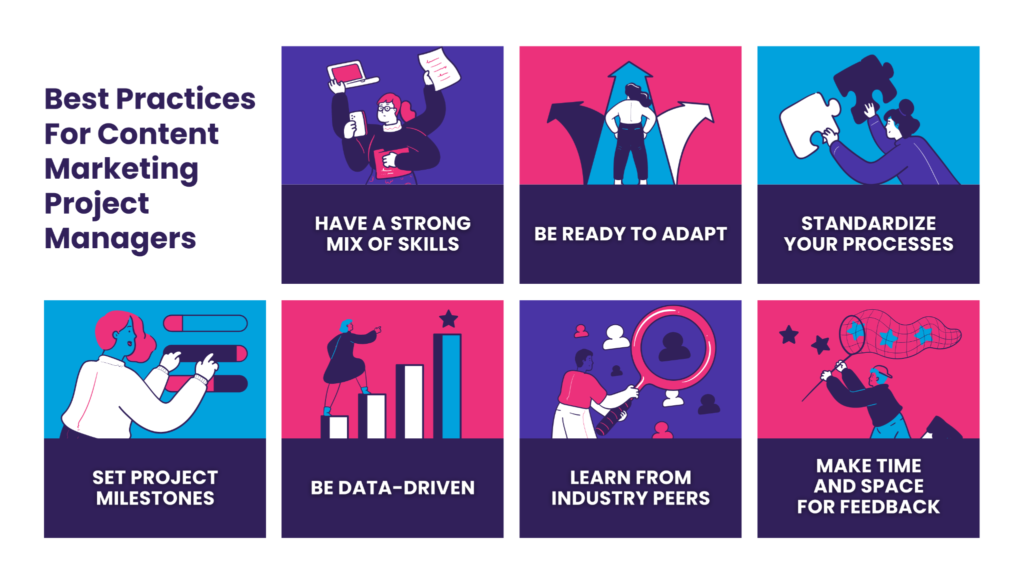Menu

Content marketing project management is a mouthful, but so is the job description of a project manager that’s in charge of reaching the target audience, increasing brand awareness, and managing the nexus between the marketing team and other departments. They lay the foundation of every successful content marketing project.
When executed correctly, your brand’s content marketing efforts can drive impressive conversion rates, but this is harder than you might think. Content creation takes a lot of work. You need a strategy, hundreds of assets, and smooth inter-department coordination. So here’s what you need to know on how to improve your content marketing project management.
Content marketing is much more than writing a blog post and taking pretty pictures. It encompasses everything from social media posts, audio, video, brand storytelling, strategy, collaborations, and even engagement. You would need a team of innovative minds that always have their creative juices flowing. But let’s be honest – creatives are not exactly the most organized individuals.
On the flip side of the same coin, project managers organize and coordinate marketing projects of all shapes, sizes, and types. Say, a business wants an audience for the launch of a new flagship product, an author needs to build up hype for a new book, or a restaurateur wants to entice people to come to his new branch. You can’t just create an announcement post, and call it a day.
You need a well-thought-out plan that takes into consideration the various roles needed (strategists, graphic designers, copywriters, and SEO specialists, among others), deliverables (digital content in different formats), and feasible deadlines. This takes a certain level of skill and discipline.
Put two and two together, content marketing project management applies systems, principles, and methodologies to creative campaigns in order to increase the chances of success. From being a creative “mess” to having a systematic workflow, a content project manager focuses on unifying an efficient solution that satisfies the client.

Before you commit yourself to a full-blown project roadmap, creative briefs are a good starting point to think about the topics you want to touch base with and the types of content you want to work on. A good creative brief outlines the deliverables for the team members involved, gives a big-picture overview, and specific details that can reduce confusion.
The idea here is to make the project management process more organized and to give everyone a sense of direction. When handling a team of individuals – each with their own personalities, expertise, and working styles – you need to get everyone on the same page.
Speaking of being on the same page, project managers need to take concrete steps for all team members, stakeholders, and clients to work towards the same content marketing goals. One way to do so is by conducting alignment meetings. The frequency depends on the needs of the project. Make sure that everyone’s still on track and supporting the content marketing campaigns in whatever way they can.
At the same time, you need to learn how to trust your co-workers. This way, you get to breathe easier and focus better. For instance, you can provide your graphic design with a folder filled with brand assets, so that you don’t have to worry about your social media posts being consistent and shades of color looking off. For the people in charge of content writing, give them a style guide, as well as a list of keywords they should prioritize.
Content marketing project management has a lot of moving parts and players. As a marketing project manager, it’s your responsibility to clearly communicate who is in charge of what, the deadliest deadlines, as well as the project milestones in order for departments to work more cohesively and to catalyze the team’s progress. If possible, create shared dashboards to track project progress and manage workloads.
Always define your marketing projects’ goals in a SMART format (specific, measurable, achievable, realistic, and time-bound), but don’t forget to add an underlying reason. Narrow down your goals to at most 3 – the ones that really matter to your brand. Each objective could also build upon another, for example:
With rapid-fire marketing project deliverables (from articles to social media posts to reels to audiograms and more), creating a coherent content marketing workflow can be a complicated task.
A writer from one project finishes the copy; the copy is handed over to the graphic designer; then the social media marketing coordinator receives outputs from different teams and doesn’t know which one to start optimizing. Bottlenecks are just bound to happen.
Great project managers are proactive. You need to be able to gain control over schedules, timelines, and content creation workflows. Being able to establish consistent processes means increasing your chances of achieving consistent results and avoiding snags.
Once everyone aligns with the content marketing goals and workflows, the next key to any successful content marketing campaign is a step-by-step plan on how to reach your North Star, all while taking into consideration your KPIs, brand positioning, and clients’ input. To streamline content strategy creation, have an editorial calendar by your side and take inspiration from these 3 content strategies:
One way to conduct competitive analysis is by identifying and “stealing” the keywords of your competitors. These keyword gaps can indicate missed or untapped opportunities for content and search engine optimizations. You can also sprinkle these topics and concepts throughout your social content. Start with any priority gaps, if any.
Organic search traffic reigns as the supreme KPI of content. Similar to keyword gap analysis, monitoring your organic traffic and positionings helps you discover insights on how to improve your content marketing projects. As people associate your content with the keyword (or topic) more and more, it builds both brand awareness and trust.
The primary objective of this strategy is to expose the chasms in your industry and consequently increase your market dominance. When you fill in backlink gaps, you’re creating content that is valuable and useful for you to appear on reputable websites. This would ultimately boost your domain authority.
Project management software can help you track projects at the pace and scale that you prefer. You’re able to plan, organize, execute, measure and stay on top of all things content marketing, as well as pivot quickly because you’re collecting data in real-time. Note that not every project management tool is created equally. Some popular examples include:
| Project Management Tool | Key Features | Pros | Cons |
| ClickUp | You can toggle between views (e.g., Gantt chart, board, list, box, only me view) and have a time tracker. | Integrations include Slack, Zoom, Google Drive, Hubspot, and GithubFeature-rich free version | Learning curveToo many notifications |
| Asana | This project management tool is used for team collaboration. Its workspaces are customizable and synced with a calendar. | Set recurring tasksLimit emails and messages | Cannot sign multiple people to the same taskUI can get a bit slow |
| Trello | Similar to supercharged sticky notes, Trello capitalizes on its simple drag-and-drop functionality. | Power-upsVisual progress | Only has Kanban viewsNot recommended for complex projects |
| Monday.com | This is good for task management and has notable features like notification and automation. | Resources management14-day free trial | Tiered, per-user privingNamed after everyone’s least favorite day of the week (unless you’re one of the weird ones?) |
| TeamWork | If it wasn’t obvious already, this is a project management tool made for teams and client work. | Invoicing capabilitiesGood mobile version | Free version useful for only small teamsOverwhelming |
After laying the groundwork, creating, editing, and all the approvals, it’s time to “do the work.” Hold a planning meeting for everyone involved in the execution of the content marketing campaign, so that you can go over the last-minute details to make your project a success. Here are some pointers:
Content marketing projects are usually cyclical and ongoing. One month, you’re content might go viral; the next month, you’re at an all-time low; then you continue to produce content for the next month, and the next – you get the idea.
That’s why it is crucial for you to regularly review progress – whether it’s a one-off or long-term project – and see where your brand currently stands in the market. Remember, when you went into this, you already set your marketing goals a.k.a. your definition of success. So how did everything play out?
Analyze the performance of individual content pieces and how they contributed to the bigger puzzle of your marketing campaign. Measure whether the marketing project outcomes reached your expectations. If you got less-than-good results, consider it a learning opportunity, and do a retro meeting with your team.

If you have a passion for content creation, an appetite for making hard decisions, and an affinity for strategizing, then you could be a project manager. Keep in mind that projects within content marketing are incredibly detailed.
Deadlines move quickly; deliverables and sub-deliverables need to be high-quality at all times; and you need to ensure that everyone is on schedule. That said, the ideal content marketing project manager should have a strong foundation in the following skills:
You should be familiar with different types of project management tools like Gantt charts, Kanban boards, and so forth. Given that the most common cause of project failure is poor planning, you need to anticipate roadblocks and have risk mitigation strategies in place.
An experienced project manager does big-picture thinking – meaning you zoom out and take a 360-degree approach to content marketing. You’ll most likely be working on various social media platforms, so you’ll need the technical expertise to move marketing projects towards optimization and in front of the eyes of more people. You’d also need to be proactive when navigating tricky and ambiguous campaigns.
You must have expertise in social media marketing, including knowing your way around social channels, creating a content calendar, and preparing monthly reports. For the most part, you need to work on your lead generation strategies because, without leads, you have no clients; without clients, you have no revenue.
Strong leaders foster productive work environments, especially when they encourage their team members to develop project management skills themselves. You have to make sure that employees feel that they’re making meaningful contributions to the content marketing projects. You should also be fair, firm, and transparent in your decision-making process.
From discovery calls to stakeholder meetings, project managers are always communicating in some way. As such, knowing how to approach people and nurturing meaningful relationships is essential for any type of project to succeed. As a project manager, you’re the go-to person. Your team’s progress heavily depends on your instructions. At the same time, don’t forget to give credit where it’s due.
There’s no such thing as a perfect project workflow, so prepare for hiccups. Reality tends to get in the way. You’re fooling yourself if you think your content marketing plan will be the same six to twelve months down the road. Know when and how to pivot. As much as possible, try to practice foresight and stay ten steps ahead of the competition.
In the same vein, while you want everyone’s creative juices and fresh ideas to keep coming, you need to know when to filter, cut, and edit. Stay true to your North Star, and keep production costs within budget.
As your marketing projects grow and evolve, it’s essential to stay organized and prioritize tasks effectively. This means standardizing all your processes – from ideation, creation, review, approval, and distribution, to analysis – to guide the direction of your team. This is when time tracking and task management come into play.
For starters, don’t forget to create detailed creative briefs to provide structure to your campaign. Towards the end of your workflow, you may need multiple rounds of review, so it’s critical to have communication lines locked down. You want to smooth out any bumps and errors along the way.
In the world of a content marketing project management, standardized processes and built-in workflows help marketers identify the best practices that lead to great content. These also make the content marketing operations scalable by specifying efficiencies and possible points of leverage. Remember: No matter what system you adopt, always simultaneously improve the quality of your marketing campaigns and make more value-adding content.
As mentioned above, project milestones measure your campaigns’ progress by breaking it down into phases. A milestone is a marker. It tells you when you’ve successfully finished a certain stage (e.g., initiation, planning, content creation, execution, analysis, closure).
For example, completing the creative brief and content calendar is usually one of the last few steps of the planning phase. This means you’re ready to move on to content creation. However, you want to set your milestones right. Depending on your organization and other variables, it may take you a longer period of time to accomplish certain tasks and deliverables.
Project managers are analytical. They need to be able to translate their findings from data analysis and market research into digestible, actionable insights. A data-driven content marketing project management methodology allows marketing professionals to make better project choices. Without statistics and numbers, you’d just be blindly shooting for your goals with your so-called “professional opinion.”
Know the story behind your metrics such as page views, impressions, click-through rates, keyword positions, conversion rates, and the like. Why did these fluctuate during a certain time? Make use of data from past content marketing campaigns, SEO research, and audience behavior to inform your report.
Make comparisons. For instance, do other companies in your industry focus on creating articles or video content? If so, have they been reaching a wide audience? When you compare the content marketing campaigns of your competitors, you can take a page out of their marketing playbook and find potential untapped audiences.
If you haven’t mastered the aforementioned skills, don’t worry. Deliberate practice makes perfect. You could attend events and workshops headed by industry leaders to help you stay abreast of the latest marketing trends and best practices. This also gives you a chance to expand your network to include other marketing project managers from whom you can learn.
Consider joining organizations and associations where you can bounce ideas off of other people in your niche. Get involved in the project management community. The people that you meet could help you get “unstuck” and brainstorm solutions to your creative challenges.
If you’ve yet to break into the field of content marketing project management, actively seek out opportunities that give you industry experience. One of the best ways to refine your skill set is by taking a degree or certificate program that is relevant to your job. To become a great project manager, you need a “lifelong learner” mentality.
As a project manager, be receptive to feedback and suggestions. It’s inevitable that content marketing teams need to go through back-and-forths during the course of a project, so you need to ensure snappy and responsive communication lines.
There’s no one-size-fits-all communications solution for content marketing teams. You need to look at your company’s ideal methods – may that be daily standup meetings or perhaps weekly alignment sessions. Tailor your communication approach to the needs of your project. You might even need communication tools like Slack, Zoom, and Microsoft Teams. In rare cases, other team members may prefer old-fashioned email.
As the point person of your brand’s marketing strategy, listen first and create last. You have to listen to your community. Their insights help you identify areas for improvement and make sure that your content is aligned with the buyer’s journey.
Pro tip: Your clients know when you’re just hearing them and not actually listening. You need to respond with relevant and personalized content. Provide them with meaningful solutions that fix their issues.
We’ll say it time and time again – marketing project management is not just about writing a blog post, boosting organic traffic to your social channels, and creating a content calendar. You need advanced knowledge of social media channels, SEO, data analysis, and a strong blend of other soft skills like leadership and effective communication.
Ideally, a project manager puts all the content pieces together and makes sure the bigger picture is completed, efficiently and exceptionally. You need to establish clear goals, use the right project management tools, and incorporate the best marketing tactics. If anything, you’re always ready to rise to the occasion.
